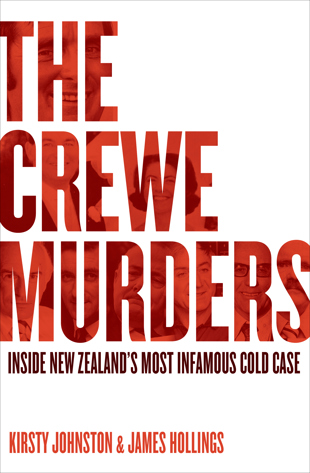Dan Eady reviews The Crewe Murders by Kirsty Johnston & James Hollings:
'The 1970 killing of Harvey and Jeanette Crewe in their Pukekawa farmhouse, followed by the discovery of their bodies in the Waikato River, has spurred decades of speculation and controversy. For over 50 years it has generated a seismic quest for the truth that has sent shockwaves through New Zealand’s public, police force and judicial and political systems. Journalists Kirsty Johnston and James Hollings step back into this emotionally charged and complex narrative.
The book offers an in depth analysis and presents new evidence and testimonies, notably from a long silent witness. The authors’ investigative skills are evident as they challenge established beliefs and introduce overlooked aspects of the case. Their attention to detail and systematic consideration of evidence key to the case is to be applauded. This is most apparent in their assembly and analysis of the evidence regarding the ballistics and cartridges of the murder weapon plus the various wire samples and vehicle axle used to submerge the bodies. The axle’s serial number casts significant doubt on its connection to twice convicted Arthur Allan Thomas.
The authors seem to suggest the book is not a whodunnit. Nonetheless, it devotes many pages presenting a blow by blow account of the key players involved while also exploring other popular theories already laid down by previous storytellers. As Len Demler’s, John Eyre’s, Arthur Thomas’, Richard Thomas’ and Len Johnston’s movements and actions are scrutinised there becomes a murder mystery feel.
The book unflinchingly probes police and judicial misconduct, particularly highlighting the roles of Detective Inspector Bruce Hutton and Len Johnston in planting and dumping key evidence. As Ross Meurant, one of the constables tasked to sieve search the Crewe garden for evidence, says: ‘‘effectively, the Commissioner of Police was telling me to lie on oath to a royal commission’’. Among many other closed door shenanigans it goes on to document the stacked jury with eight pro police witnesses within the second court case. Thomas’ pardon remains the only free pardon for homicide ever given in this country, and one of only four given at all. This book effectively showcases the Crewe case as a critical test to New Zealand’s policing, judicial and political systems.
Although much seems to be made of ‘‘striking new information’’, Ross Eyre’s intriguing account, as a schoolboy standing on SH22 a day or so after the Crewes were killed, feels by the time we reach it like too little too late. Rather than something new to illuminate the heart of this old story it appears more as an afterthought. His recounting of Tutu Hoeta’s story, the local shearer who later drove past the Crewe property, also feels lost.
While the authors present a detailed and objective look at one of New Zealand’s most notorious cold cases, they stop well short of providing a definitive answer to the mystery, which is more a reflection of the case’s inherent complexities corrupted by decades of misinformation and confirmation bias.'


